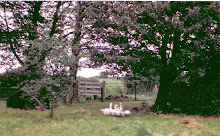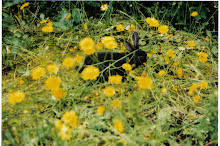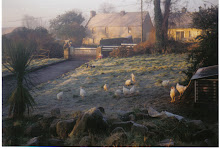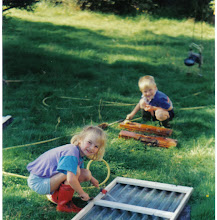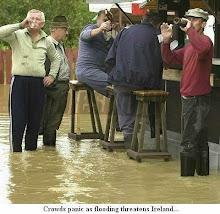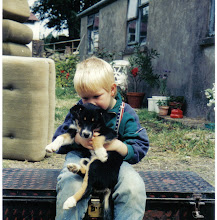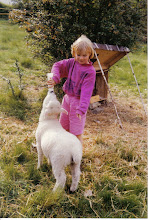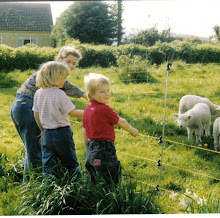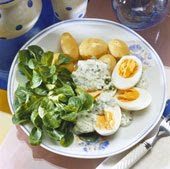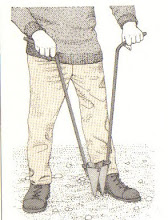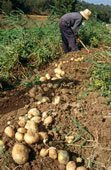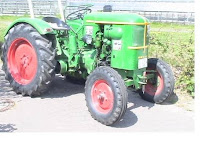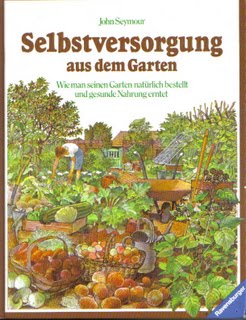Athblian shona duit! (Happy new year!)
The summer proceeded; our little farm set up grew by a beautiful hairy cat that looked like a grey-striped tiger. A neighbor’s kid that Amy had befriended brought her over. A farm needs a cat like a flower needs the rain. She was young and of the cuddly sort, not the independent kind that scratches and goes missing. We called her Wuschel. Together with Brandy, the dog, she lived in the sheds which we had cushioned with straw and presumably there were plenty of mice to catch. Growing up together made them friends or at least tolerate each other. Brandy didn’t like, however, when Wuschel went anywhere near his food.
The weather went back to normal. Occasional rain watered our little plants in the garden that we had first sown indoors into prepared trays of humus rich soil and then planted outside when they were a several inches tall: broccoli, peas, and carrots. Onions were planted next to the carrots. This symbiosis keeps the carrot fly away and bugs under control.
Since we didn't have our own veggies to eat yet that summer, I had to resort buying from the one little local shop. (We certainly didn't drive 20 km to the next bigger shop. A real supermarket like I knew from Germany opened only a few years later in Limerick- 20km away.) The broccoli they had there came from the USA and the spuds came from Cyprus. So much for Ireland being an agricultural country. No local little farmer produced veggies at that time--because they could "buy everything in the shops now" and also had the money for it in contrast to the old, pre-European Union days.
We looked hard for strawberries, although it was late in the planting season to get them started. Impossible to find as there was only one nursery in a radius of over many miles. “Where do you get the plants? Everybody loves strawberries.” The answer came from our housekeeper’s brother who helped out occasionally doing a painting job on the house. “You can’t buy them. Everybody has them in the garden. “ Then I learned that strawberries multiplied by producing layers running along the ground like tentacles which you have to cut off otherwise they run wild and take over. “Can I buy some?” “No need to pay. People will give them to you for free.”
“For free?”
“Sure, in fact deydumpim.” What? “Dey dump ‘em.” At this stage I need to explain that the local accent pronounces ‘th’ like a ‘d’ or a ‘t’. That clarified, I got a bucket full of layers for free no problem. The plants would only carry fruit in the following year. A local gardener sold Pick your own strawberries and redcurrants as well as raspberries from his garden. That kept us going in the first summer and also provided enough cuttings. These berries – i.e. their shrubs- grow from cuttings.
In the meantime, Amy made great progress at school. I had taught her my version of English which I had learned myself at university, and that was BBC or British Standard English. Her teachers, however, pronounced the ‘th’ in three like t. I heard her constant one-two-tree while skipping. A futile attempt to teach her otherwise. My teacher’s ears flinched but there was no convincing her. 33 remained tirty-tree for many years. Patrick remained silent and didn’t care one way or the other.
Thursday, December 31, 2009
Tuesday, December 15, 2009
Our River
The farm we bought had a km of a river without a name, about 10 feet wide, narrower in the summer and swollen during the winter. Well, in my view a brook really, but nobody used that term. The previous owners, an elderly couple that wanted to retire still had experienced salmon to swim upstream for hatching purposes. These people had no children, therefore sold the farm in order to move to a single-storey bungalow with all the mod-cons like central heating and no stairs to climb. (First thing I had done to the house was have a heating system installed when we took it over on a cold November day. While that was put in, I stayed in the hotel.)They must have been the hardy bunch to survive just on the kitchen based coal fired stove. The water heating stove in the dinigroom sent hot water up to the bathroom; heat of some kind but hardly enough for somebody who did not grow up accustomed to frosty windowpanes inside a room- like most Irish had. They were also responsible for the water pipes to be laid from the well to the house, meaning in their first years of marriage they carried buckets of water for hundreds of yards up and down hill.Ironically, they were of German extraction, their forebears came from Palatine in the late 1800's. Their family name in German meant "Miner". As we had downsized considerably from our new German home to this 3-bed house, we referred to it as the "Humble Miner's House" whereas for people in the village it was always the Big House. This was a term usually reserved for really big houses belonging to the Protestant gentry or (hated) English landowners.
Unfortunately, we never spotted any salmon in the river, only some little unidentified fish – but we were not knowledgeable in fishing anyway. The lowest point of our fields had a ford with stepping stones where you could walk through it for most of the year. The word ford still exists in ‘Oxford’ and in the German town’s name of Frankfurt.
A path wide enough for a tractor wended its way down from our house to the river through a big field. It was badly drained and couldn’t be used for grazing until we had draining done a year later. Cattle could get stuck in the mud there. Not pleasant for the rescuers either! For us it was the swampy field.
The by-product, however, was the most beautiful scene of thousands of yellow wild lilies or flaggers, as they are called in Ireland. At the end of May, I had a brainwave and thought I could sell them to the tiny flower shop that didn’t have much of a selection, mostly carnations and plastic wreaths for graves. The children and I picked arms full. By the time we put them into water up at the house, they started to shrivel as one-day creatures do. When Mac decided two years later to have drainage put into the field I quietly cried about the loss of wildflowers and the beautiful scene, sacrificing that to productivity.
Until a few years before we took over the farm, water of the river was connected to the mains and used in the village as drinking water. The pump house was still there but wasn’t serviced anymore since it had been taken out of use. The tap down by the school, however, was still working and supplying people who came to fill empty milk containers, gallons size.
I often sat by the little brook, listening to the gurgling noise of the water. A kind of mediation to ease my mind, communicate with nature, and take in the beauty of my new home- the move had not been totally of my free will.
Unfortunately, we never spotted any salmon in the river, only some little unidentified fish – but we were not knowledgeable in fishing anyway. The lowest point of our fields had a ford with stepping stones where you could walk through it for most of the year. The word ford still exists in ‘Oxford’ and in the German town’s name of Frankfurt.
A path wide enough for a tractor wended its way down from our house to the river through a big field. It was badly drained and couldn’t be used for grazing until we had draining done a year later. Cattle could get stuck in the mud there. Not pleasant for the rescuers either! For us it was the swampy field.
The by-product, however, was the most beautiful scene of thousands of yellow wild lilies or flaggers, as they are called in Ireland. At the end of May, I had a brainwave and thought I could sell them to the tiny flower shop that didn’t have much of a selection, mostly carnations and plastic wreaths for graves. The children and I picked arms full. By the time we put them into water up at the house, they started to shrivel as one-day creatures do. When Mac decided two years later to have drainage put into the field I quietly cried about the loss of wildflowers and the beautiful scene, sacrificing that to productivity.
Until a few years before we took over the farm, water of the river was connected to the mains and used in the village as drinking water. The pump house was still there but wasn’t serviced anymore since it had been taken out of use. The tap down by the school, however, was still working and supplying people who came to fill empty milk containers, gallons size.
I often sat by the little brook, listening to the gurgling noise of the water. A kind of mediation to ease my mind, communicate with nature, and take in the beauty of my new home- the move had not been totally of my free will.
Monday, December 14, 2009
As Right as Rain
A shortage of water in Ireland - sounds like an oxymoron? There is usually precipitation of some kind and degree every day. Or as the national weather man once forecast, “We don’t know exactly where and when, but we know it’s going to rain tomorrow,” to the utter amusement of our visitors. Indeed it does.
Our house like all other farms outside the village weren’t on the mains. Neither was the sewerage nor the effluent. As right as rain? That phrase never held much water until our well ran dry. The well, our own water supply, was located on the highest field on a little hill and came to our house through copper pipes and by gravity. It had not rained for almost 4 weeks. Water pressure began to decrease and finally was reduced to a dribble. The outside water basin was still full. That water was used for the animals, watering of our new plants and seedlings, and during the last days of the draught for our toilet. I carried about 4 buckets a day upstairs to the bathroom. For our own drinking purpose I went over to the neighbors with a kettle a couple of times a day. This predicament lasted only a few days, but repeated itself that August. More than 2 good weeks a year? Absolutely unheard of but true in 1990 and nobody wanted it that good…
Storing water in reservoirs was a novelty back then. There are 7 reservoirs now in Ireland: (http://en.wikipedia.org/wiki/List_of_reservoirs_and_dams). The Water Service Act of 2007 was introduced for times of draught. As of 2010 households on public water schemes will have to pay for their water.
All villages and towns around Lough Derg let their run-off (household and farm) directly go into the lake. The first water treatment plant was built around 2003 in Mountshannon. The popular boating hub on the Shannon, Killaloe, and all tourists on their boats on the lake, discharged their effluents directly into the lake. (http://www.discoverloughderg.ie/MapZone).
From one extreme to the other. If you heard of the recent flooding, the worst in donkeys' years, please have a look at my favorite Irish picture blog done by Paz to get an impression: (http://www.irelandinpicture.net/2009/11/floods-in-galwaya-typical-irish-winter.html).
Our house like all other farms outside the village weren’t on the mains. Neither was the sewerage nor the effluent. As right as rain? That phrase never held much water until our well ran dry. The well, our own water supply, was located on the highest field on a little hill and came to our house through copper pipes and by gravity. It had not rained for almost 4 weeks. Water pressure began to decrease and finally was reduced to a dribble. The outside water basin was still full. That water was used for the animals, watering of our new plants and seedlings, and during the last days of the draught for our toilet. I carried about 4 buckets a day upstairs to the bathroom. For our own drinking purpose I went over to the neighbors with a kettle a couple of times a day. This predicament lasted only a few days, but repeated itself that August. More than 2 good weeks a year? Absolutely unheard of but true in 1990 and nobody wanted it that good…
Storing water in reservoirs was a novelty back then. There are 7 reservoirs now in Ireland: (http://en.wikipedia.org/wiki/List_of_reservoirs_and_dams). The Water Service Act of 2007 was introduced for times of draught. As of 2010 households on public water schemes will have to pay for their water.
All villages and towns around Lough Derg let their run-off (household and farm) directly go into the lake. The first water treatment plant was built around 2003 in Mountshannon. The popular boating hub on the Shannon, Killaloe, and all tourists on their boats on the lake, discharged their effluents directly into the lake. (http://www.discoverloughderg.ie/MapZone).
From one extreme to the other. If you heard of the recent flooding, the worst in donkeys' years, please have a look at my favorite Irish picture blog done by Paz to get an impression: (http://www.irelandinpicture.net/2009/11/floods-in-galwaya-typical-irish-winter.html).
Monday, December 7, 2009
Brandy- not Whiskey
Before we knew it we had a dog. Every farm needs a dog, especially once you have sheep or cattle. Irish sheep dogs are bred for that purpose in particular, but ours turned out to be a mixture between Border collie and God knows what. The kids were delighted. Our promise of a dog had been a big incentive luring them into this adventure of emigration, something not easy to understand for little ones who had to leave behind their familiar surroundings and friends.
The pup was about 8 weeks old. We named her Brandy although she was more black and white than brown. “So, will the next one then be called Whiskey?”, the neighbor who gave her to us asked in true Irish humor. Brandy turned out to be an excellent watch dog and an expert at rounding up herds. A few months later that autumn, she already was pregnant with 11 puppies. That fertility continued over the years. We kept one of her first litter, Brownie, who became an expert football player, snatching the ball in real goalie fashion. She was useless with the animals however. Patrick loved to play football with Brownie though he found it not fair that she was better at it than him. “No wonder, she has 4 legs…” he groused. Brownie was a devil for following cars down the road attempting to bite their tires and was run over in the process twice. She would retreat to her dog house and not eat for a couple of days but then be at it again relentlessly- or shall I say stupidly?
May weather was beautiful and warm that year promising a long hot summer or so I thought. My enthusiasm was curtailed by the prevailing Irish wisdom, however, that “we only get 2 weeks of summer a year”. That’s it. But it was only May? Wait till you see. By the end of May I had unpacked most boxes and got ready for our first set of visitors. And we ran out of water….
The pup was about 8 weeks old. We named her Brandy although she was more black and white than brown. “So, will the next one then be called Whiskey?”, the neighbor who gave her to us asked in true Irish humor. Brandy turned out to be an excellent watch dog and an expert at rounding up herds. A few months later that autumn, she already was pregnant with 11 puppies. That fertility continued over the years. We kept one of her first litter, Brownie, who became an expert football player, snatching the ball in real goalie fashion. She was useless with the animals however. Patrick loved to play football with Brownie though he found it not fair that she was better at it than him. “No wonder, she has 4 legs…” he groused. Brownie was a devil for following cars down the road attempting to bite their tires and was run over in the process twice. She would retreat to her dog house and not eat for a couple of days but then be at it again relentlessly- or shall I say stupidly?
May weather was beautiful and warm that year promising a long hot summer or so I thought. My enthusiasm was curtailed by the prevailing Irish wisdom, however, that “we only get 2 weeks of summer a year”. That’s it. But it was only May? Wait till you see. By the end of May I had unpacked most boxes and got ready for our first set of visitors. And we ran out of water….
Subscribe to:
Comments (Atom)




























